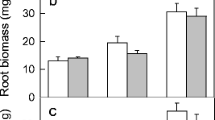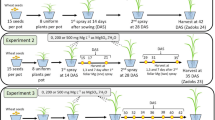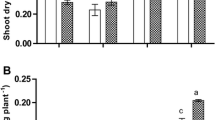Abstract
Background & aim
It is unclear how elevated CO2 (eCO2) affects the response of crops to soil acidity. This study examined the effect of eCO2 on acid-soil tolerance of hexaploid wheat genotypes that vary in Al3+ resistance due to differences in root efflux of citrate and malate.
Methods
Three pairs of near-isogenic lines were grown for 24–25 days under ambient CO2 (400 µmol mol-1) and eCO2 (800 µmol mol-1) in acid soils and hydroponics with various Al3+ concentrations. The lines consisted of pairs that differed in alleles of the TaALMT1 and TaMATE1B genes. Plant growth parameters and rhizosphere soil properties were measured.
Results
Elevated CO2 increased the slope of negative correlations between root and shoot biomass and Al3+ concentration in the rhizosphere of a line that has an Al3+-sensitive allele of the TaALMT1 gene conditioning malate efflux (ES8), but did not change that of a near-isogenic sister line with an Al3+-resistant TaALMT1 allele (ET8). Elevated CO2 decreased the relative root length and biomass (% of limed soil) of a line that lacked both malate and citrate efflux (Egret), but did not affect lines that possessed either malate or citrate efflux. Elevated CO2 had no effect on either malate or citrate efflux from root tips of Al3+-resistant lines. Elevated CO2 also increased Al3+ concentration and decreased NH4+ concentration in rhizosphere soil, but decreased concentrations of Al and Zn in shoots.
Conclusions
Elevated CO2 decreased acid-soil tolerance of Al3+sensitive genotypes but not of Al3+ resistant genotypes. Malate efflux played a dominant role in conferring acid-soil tolerance to hexaploid wheat.


Similar content being viewed by others

References
Bloom AJ, Burger M, Asensio JSR, Cousins AB (2010) Carbon dioxide enrichment inhibits nitrate assimilation in wheat and Arabidopsis. Science 328:899–903
Carlisle E, Myers S, Raboy V, Bloom A (2012) The effects of inorganic nitrogen form and CO2 concentration on wheat yield and nutrient accumulation and distribution. Front Plant Sci 3:1–13
Delhaize E, Craig S, Beaton CD, Bennet RJ, Jagadish VC, Randall PJ (1993a) Aluminum tolerance in wheat (Triticum aestivum L.) (I. Uptake and distribution of aluminum in root apices). Plant Physiol 103:685–693
Delhaize E, Ryan PR, Randall PJ (1993b) Aluminum tolerance in wheat (Triticum aestivum L.) (II. Aluminum-stimulated excretion of malic acid from root apices). Plant Physiol 103:695–702
Delhaize E, Ma JF, Ryan PR (2012) Transcriptional regulation of aluminium tolerance genes. Trends Plant Sci 17:341–348
Guo JH, Liu XJ, Zhang Y, Shen JL, Han WX, Zhang WF, Christie P, Goulding KWT, Vitousek PM, Zhang FS (2010) Significant acidification in major Chinese croplands. Science 327:1008–1010
Guo H, Zhu J, Zhou H, Sun Y, Yin Y, Pei D, Ji R, Wu J, Wang X (2011) Elevated CO2 levels affects the concentrations of copper and cadmium in crops grown in soil contaminated with heavy metals under fully open-air field conditions. Environ Sci Technol 45:6997–7003
Guo B, Dai S, Wang R, Guo J, Ding Y, Xu Y (2015) Combined effects of elevated CO2 and cd-contaminated soil on the growth, gas exchange, antioxidant defense, and cd accumulation of poplars and willows. Environ Exp Bot 115:1–10
Han C, Zhang P, Ryan PR, Rathjen TM, Yan Z, Delhaize E (2016) Introgression of genes from bread wheat enhances the aluminium tolerance of durum wheat. Theor Appl Genet 129:1–11
Hinsinger P, Plassard C, Tang C, Jaillard B (2003) Origins of root-mediated pH changes in the rhizosphere and their responses to environmental constraints: a review. Plant Soil 248:43–59
Huang B, Xu Y (2015) Cellular and molecular mechanisms for elevated CO2–regulation of plant growth and stress adaptation. Crop Sci 55:1–20
IPCC (2014) Climate change 2014: synthesis report. Contribution of working groups I, II and III to the fifth assessment report of the intergovernmental panel on climate change [Core writing team, R.K. Pachauri and L.a. Meyer (Eds.)]. IPCC, Geneva
Isbell R (1996) The Australian soil classification. CSIRO publishing, Melbourne
Jia Y, Tang S, Wang R, Ju X, Ding Y, Tu S, Smith DL (2010) Effects of elevated CO2 on growth, photosynthesis, elemental composition, antioxidant level, and phytochelatin concentration in Lolium mutiforum and Lolium perenne under cd stress. J Hazard Mater 180:384–394
Jia X, Wang W, Chen Z, He Y, Liu J (2014) Concentrations of secondary metabolites in tissues and root exudates of wheat seedlings changed under elevated atmospheric CO2 and cadmium-contaminated soils. Environ Exp Bot 107:134–143
Jia X, Liu T, Zhao Y, He Y, Yang M (2016) Elevated atmospheric CO2 affected photosynthetic products in wheat seedlings and biological activity in rhizosphere soil under cadmium stress. Environ Sci Pollut Res 23:514–526
Jin J, Tang C, Robertson A, Franks AE, Armstrong R, Sale P (2014) Increased microbial activity contributes to phosphorus immobilization in the rhizosphere of wheat under elevated CO2. Soil Biol Biochem 75:292–299
Johansson EM, Fransson PMA, Finlay RD, van Hees PAW (2009) Quantitative analysis of soluble exudates produced by ectomycorrhizal roots as a response to ambient and elevated CO2. Soil Biol Biochem 41:1111–1116
Kerven GL, Edwards DG, Asher CJ, Hallman PS, Kokot S (1989) Aluminum determination in soil solution. 2. Short-term colorimetric procedures for the measurement of inorganic monomeric aluminum in the presence of organic acid ligands. Soil Res 27:91–102
Khabaz-Saberi H, Rengel Z, Wilson R, Setter TL (2010) Variation of tolerance to manganese toxicity in Australian hexaploid wheat. J Plant Nutr Soil Sci 173:103–112
Kochian LV, Piñeros MA, Liu J, Magalhaes JV (2015) Plant adaptation to acid soils: the molecular basis for crop aluminum resistance. Annu Rev Plant Biol 66:571–598
Kopittke PM, McKenna BA, Karunakaran C, Dynes JJ, Arthur Z, Gianoncelli A, Kourousias G, Menzies NW, Ryan PR, Wang P, Green K, Blamey FPC (2017) Aluminum complexation with malate within the root apoplast differs between aluminum resistant and sensitive wheat lines. Front Plant Sci 8:1–11
Li Z, Tang S, Deng X, Wang R, Song Z (2010) Contrasting effects of elevated CO2 on cu and cd uptake by different rice varieties grown on contaminated soils with two levels of metals: implication for phytoextraction and food safety. J Hazard Mater 177:352–361
Li T, Tao Q, Han X, Yang X (2013) Effects of elevated CO2 on rhizosphere characteristics of cd/Zn hyperaccumulator Sedum alfredii. Sci Total Environ 454–455:510–516
Li Y, Wang L, Yang L, Li H (2014) Dynamics of rhizosphere properties and antioxidative responses in wheat (Triticum aestivum L.) under cadmium stress. Ecotoxicol Environ Saf 102:55–61
Madhu M, Hatfield JL (2013) Dynamics of plant root growth under increased atmospheric carbon dioxide. Agron J 105:657–669
Pereira JF, Barichello D, Ferreira JR, Aguilera JG, Consoli L, da Silva Júnior JP, Bonow S, Cargnin A (2015) TaALMT1 and TaMATE1B allelic variability in a collection of Brazilian wheat and its association with root growth on acidic soil. Mol Breed 35:1–16
Phillips RP, Finzi AC, Bernhardt ES (2011) Enhanced root exudation induces microbial feedbacks to N cycling in a pine forest under long-term CO2 fumigation. Ecol Lett 14:187–194
Rayment GE, Lyons DJ (2011) Olsen-P, Colwell-P and P buffer index. In: Rayment GE, Lyons DJ (eds) Soil chemical methods - Australasia. CSIRO Publishing, Melbourne
Rogers HH, Prior SA, Runion GB, Mitchell RJ (1995) Root to shoot ratio of crops as influenced by CO2. Plant Soil 187:229–248
Ryan PR, Delhaize E, Randall PJ (1995a) Malate efflux from root apices and tolerance to aluminium are highly correlated in wheat. Funct Plant Biol 22:531–536
Ryan PR, Delhaize E, Randall PJ (1995b) Characterisation of Al-stimulated efflux of malate from the apices of Al-tolerant wheat roots. Planta 196:103–110
Ryan PR, Raman H, Gupta S, Horst WJ, Delhaize E (2009) A second mechanism for aluminum resistance in wheat relies on the constitutive efflux of citrate from roots. Plant Physiol 149:340–351
Ryan PR, Tyerman SD, Sasaki T, Furuichi T, Yamamoto Y, Zhang WH, Delhaize E (2011) The identification of aluminium-resistance genes provides opportunities for enhancing crop production on acid soils. J Exp Bot 62:9–20
Sasaki T, Yamamoto Y, Ezaki B, Katsuhara M, Ahn SJ, Ryan PR, Delhaize E, Matsumoto H (2004) A wheat gene encoding an aluminum-activated malate transporter. Plant J 37:645–653
Scott BJ, Fisher JA, Spohr LJ (1998) Manganese tolerance in a range of wheat genotypes. Commun Soil Sci Plant Anal 29:219–235
Tang C, Robson AD, Dilworth MJ (1990) A split-root experiment shows that iron is required for nodule initiation in Lupinus angustifolius L. New Phytol 115:61–67
Tang C, Diatloff E, Rengel Z, McGann B (2001) Growth response to subsurface soil acidity of wheat genotypes differing in aluminium tolerance. Plant Soil 236:1–10
Tang C, Rengel Z, Abrecht D, Tennant D (2002) Aluminium-tolerant wheat uses more water and yields higher than aluminium-sensitive one on a sandy soil with subsurface acidity. Field Crop Res 78:93–103
Tian Q, Zhang X, Gao Y, Bai W, Ge F, Ma Y, Zhang W (2013) Wheat genotypes differing in aluminum tolerance differ in their growth response to CO2 enrichment in acid soils. Ecol Evol 3:1440–1448
Wang L, Feng Z, Schjoerring JK (2013) Effects of elevated atmospheric CO2 on physiology and yield of wheat (Triticum aestivum L.): a meta-analytic test of current hypotheses. Agric Ecosyst Environ 178:57–63
Widodo BMR, Rose T, Frei M, Pariasca-Tanaka J, Yoshihashi T, Thomson M, Hammond JP, Aprile A, Close TJ, Ismail AM, Wissuwa M (2010) Response to zinc deficiency of two rice lines with contrasting tolerance is determined by root growth maintenance and organic acid exudation rates, and not by zinc-transporter activity. New Phytol 186:400–414
Wright RJ (1989) Soil aluminum toxicity and plant growth. Commun Soil Sci Plant Anal 20:1479–1497
Wu H, Tang S, Zhang X, Guo J, Song Z, Tian S, Smith DL (2009) Using elevated CO2 to increase the biomass of a Sorghum vulgare×Sorghum vulgare var. sudanense hybrid and Trifolium pratense L. and to trigger hyperaccumulation of cesium. J Hazard Mater 170:861–870
Acknowledgements
We thank Dr. Zhiqian Liu for his technical support on measuring organic anions, and Dominic Lauricella, Clayton Butterly and Qiao Xu for helpful discussion and assistance on collecting and preparing soils.
Author information
Authors and Affiliations
Corresponding author
Additional information
Responsible Editor: Jian Feng Ma.
Electronic supplementary material
ESM 1
(DOCX 190 kb)
Rights and permissions
About this article
Cite this article
Dong, J., Hunt, J., Delhaize, E. et al. The impact of elevated CO2 on acid-soil tolerance of hexaploid wheat (Triticum aestivum L.) genotypes varying in organic anion efflux. Plant Soil 428, 401–413 (2018). https://doi.org/10.1007/s11104-018-3687-5
Received:
Accepted:
Published:
Issue Date:
DOI: https://doi.org/10.1007/s11104-018-3687-5



